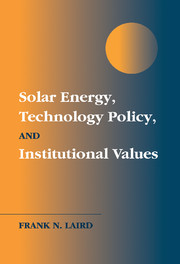Preface
Published online by Cambridge University Press: 21 July 2009
Summary
Why do governments take seriously some policies and not others? Indeed, what does it mean to say that a government takes a policy “seriously”? What distinguishes fringe policies from their mainstream counterparts, and how can policies move from one to the other? This study addresses these questions through an analysis of U.S. renewable energy policy. The result is a longitudinal case study of energy policy change that explains what has been taken seriously and what has not, and why.
As other authors have noted, although we discuss energy systems in the language of BTUs and barrels of oil, they are so pervasive and important that arguments about them are, in many instances, arguments about the kind of society that people desire. This concept helps us to understand how much was at stake in energy policy decisions between the end of World War II and the postoil embargo period in the United States – the period that this study examines. This feature of energy policy makes it a prime example of what I call policies for the future. In the coming decades public policy, among other influences, will shape emerging technological systems. Those systems will, in turn, condition and constrain important political and social decisions. That fact makes it imperative that we better understand and deliberate over such policies.
Recent studies of politics and policy have emphasized the importance of ideas in shaping the political world, and this work builds on that literature.
- Type
- Chapter
- Information
- Solar Energy, Technology Policy, and Institutional Values , pp. ix - xiiPublisher: Cambridge University PressPrint publication year: 2001



